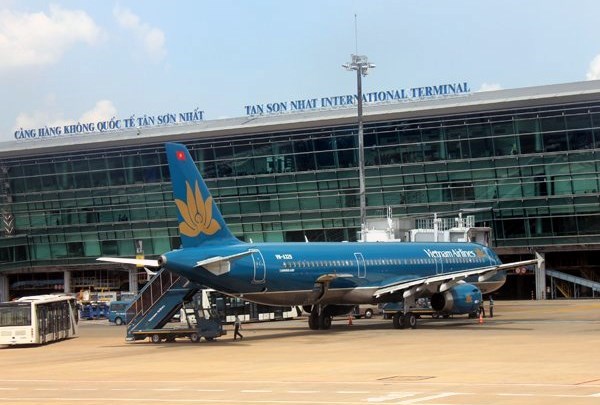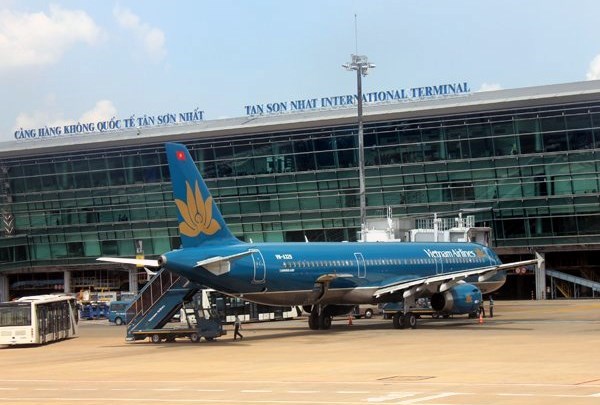
Prime Minister Nguyen Xuan Phuc has agreed with the proposal of the French consultant company ADP-I to build a new passenger terminal south of Tan Son Nhat aiport in Ho Chi Minh City as part of the airport expansion plan.
The Tan Son Nhat International Airport has become seriously overloaded, forcing many flights to wait in the air to land (Photo: VNA).
The terminal,
with infrastructure meeting international standards, is expected to serve 20
million passengers per year, helping increase the capacity of the airport to
handle 50 million passengers per annum by 2025.
The Tan Son Nhat International Airport has become seriously overloaded,
forcing many flights to wait in the air to land. The airport has a design
capacity of 25 million passengers but the passenger throughput in 2016 was 32
million and in 2017 over 36 million, making the expansion of the airport an
urgent task.
The French firm recommended building support facilities including a cargo
terminal and an aircraft maintenance station in the airport’s northern area.
According to the PM, this could handle overload in air transport, ensure
effective land use and reduce investment costs and guarantee safety and
security in line with regulations of the International Civil Aviation
Organisation.
The government leader assigned the Ministry of Transport to direct the French
consultant company to continue working with the Vietnamese counterpart ADCC
under the Ministry of National Defence to complete the adjustment of the
expansion plan, ensuring efficiency, especially in land use in the north and
the south of the airport.
He asked the ministry to work with the HCM City People’s Committee to
devise feasible measures to reduce traffic jams around the airport.
The ministry must finalise legal dossiers for approving the adjustment of
the expansion plan and relevant planning schemes in addition to devising
mechanisms and policies to implement the projects, particularly defining a
roadmap to build support facilities in the northern area of the airport, the PM
said.
He entrusted the Ministry of National Defence to work with the Ministry of
Transport, the Ministry of Natural Resources and Environment and the HMC City
People’s Committee to review the use of land for defence purpose in areas
around the airport and relocate camps of military units to adjust the defence
land use plan.
The Ministry of Planning and Investment and the Ministry of Finance are
responsible for addressing shortcomings to ensure the progress of projects.
Source: VNA
According to data from the Hoa Binh Provincial Party Committee, the industrial production index for the first six months of 2025 is estimated to have increased by 20% compared to the same period last year. This marks the highest year-on-year growth rate for this period since 2020.
In the first six months of 2025, Hoa Binh province’s export turnover was estimated at 1.145 billion USD, marking an 18.11% increase compared to the same period in 2024. Import turnover was estimated at $ 804 million, a 17.15% increase, which helped the province maintain a positive trade balance.
The lives of the ethnic minority farmers in Tan Lac district have gradually improved thanks to the new directions in agricultural production. This is a testament to the collective strength fostered through the professional associations and groups implemented by various levels of the district’s Farmers’ Union.
With the motto the "product quality comes first,” after nearly one year of establishment and operation, Muong village’s Clean Food Agricultural and Commercial Cooperative, located in Cau Hamlet, Hung Son Commune (Kim Boi district), has launched reputable, high-quality agricultural products to the market that are well-received by consumers. The products such as Muong village’s pork sausage, salt-cured chicken, and salt-cured pork hocks have gradually carved out a place in the market and they are on the path to obtaining the OCOP certification.
In the past, the phrase "bumper harvest, rock-bottom prices" was a familiar refrain for Vietnamese farmers engaged in fragmented, small-scale agriculture. But today, a new spirit is emerging across rural areas of Hoa Binh province - one of collaboration, organisation, and collective economic models that provide a stable foundation for production.
Maintaining growing area codes and packing facility codes in accordance with regulations is a mandatory requirement for agricultural products to be eligible for export. Recently, the Department of Agriculture and Environment of Hoa Binh province has intensified technical supervision of designated farming areas and packing facilities to safeguard the "green passport" that enables its products to access international markets.



